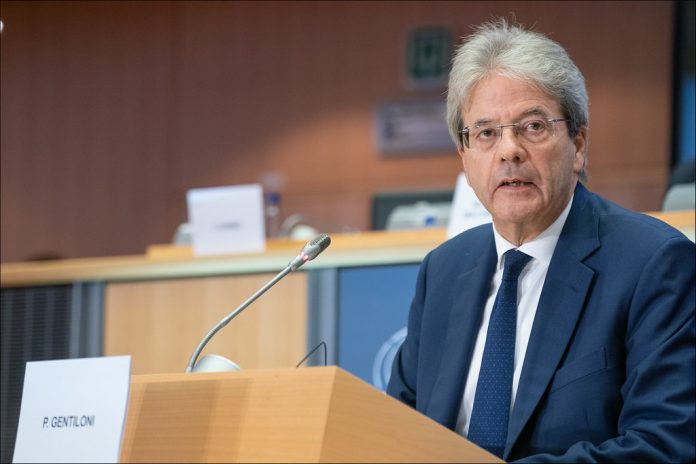
This week, EU Economy Commissioner Paolo Gentiloni (picture) proposed to harmonise corporate taxation in the European Union. Under its so-called “Business in Europe: Framework for Income Taxation (BEFIT)”, a single EU corporate tax rulebook would be created, involving reallocation of profits between member states. An actual legislative proposal would only be presented in 2023, however.
As I have pointed out in a previous contribution on this website, the European Commission has a long track record in attempting to get its hands on taxation policy, something that has been compounded with Brexit. This is simply yet another attempt, labelled with yet another acronym, alongside other continuing attempts, like the so-called “common consolidated corporate tax base (CCCTB), the Carbon Border Adjustment Mechanism” (CBAM) or the EU digital services tax (DST).
Fundamentally, these are all bad ideas, not only because of subsidiarity and democracy concerns, but also because tax competition secures a “race to the top” when it comes to the quality of the services provided by governments. The French government is perfectly able to copy the large expenditure cuts the Irish government enacted in 1987 to bring the budget back into line, enabling it to cut corporation taxes, something which turned it into the Celtic Tiger. French politicians however prefer to focus their efforts on harmonizing taxes at the EU level. Thankfully, unanimity still prevails, but the pressure is becoming harder to resist, as the United Kingdom, a powerful opponent of these attempts, is no longer around.
Meanwhile, the same UK has decided to design certain areas as so-called “freeports”, which would mean that they are offered tax breaks and lower tariffs, including less national insurance for all new workers.
As a result of Brexit, tax breaks offered to freeport firms will no longer require prior agreement from the European Commission, enabling them to be much more generous, which in turn puts more pressure on EU member states to reduce taxes. Going in the opposite direction by harmonizing taxes at the EU level, thereby depriving EU member states of means to deal with increased UK competition, is therefore not the smartest idea.
In particular current EU Competition Commissioner Margrethe Vestager, once dubbed the “tax lady” by former U.S. President Trump, has been attempting to redefine tax breaks as unfair state aid, claiming these would not fairly apply to everyone. She did lose a few cases at the top EU Court over this, but it is a sign of the European Commission’s zeal to stamp out any tax competition, let alone that it would allow freeports to develop as tax havens within the EU.
The EU does contain a number of freeports however, for example in Luxembourg. Deprived of the ability to attract business on the basis of a materially lower tax burden, there seems to be a problem of these places emerging as a hotspot for smuggling. At least, that’s what the some in the European Parliament has been claiming. In 2019, after a visit to Luxembourg’s Freeport, MEP Anamaria Gomes complained that “this is a way that could be easily used to store goods away from anybody’s control, for putting them in the dark when it’s more convenient (…) The controls were extremely perfunctory and we did not see any real attempt to establish who were the real owners of the goods.”
In particular, EU freeports would support illicit trade in tobacco and pharmaceutical products. That’s what analysis conducted by Transcrime found, which concluded that when it comes to tobacco smuggling, “almost all significant origin and transit points host Free-trade zones (FTZs)”, a more generic term for freeports, specifying:
“FTZs may be exploited to conceal the nature of the product and thus make it more difficult for law enforcement to track the activities (WEF 2012). As proof of this, between 2010 and 2013 LEAs seized large tobacco shipments in the ports of Hamburg (Germany), Piraeus and Thessaloniki”.
According to the OECD, the establishment of a new free trade zone “is associated with a 5.9% rise in the value of counterfeit exports from the host economy”. However, it seems to very much depend on how freeports are structured. According to UK think tank RUSI, in Morocco, for example, free zones may actually pose lower criminal risks than other border crossings and logistics hubs as they are subject to a higher level of regulation and control.
Now that Brexit has happened, the UK is only constrained by more lenient WTO rules to develop its freeports. The EU-UK deal hardly offers the EU any legal recourse against these kind of buccaneering UK low tax projects.
Of course, the need for freeports is also a consequence of the heavy taxes, regulations and customs that burden ordinary trade. In an ideal scenario, overall cuts to taxes, customs and regulations for the whole territory and not only for selected areas would be preferable. However, we are we are, and the last thing the EU should be doing is to constrain the fiscal policy hands of its member states in the face of greater fiscal competition, unleashed by the United Kingdom’s freeports.












